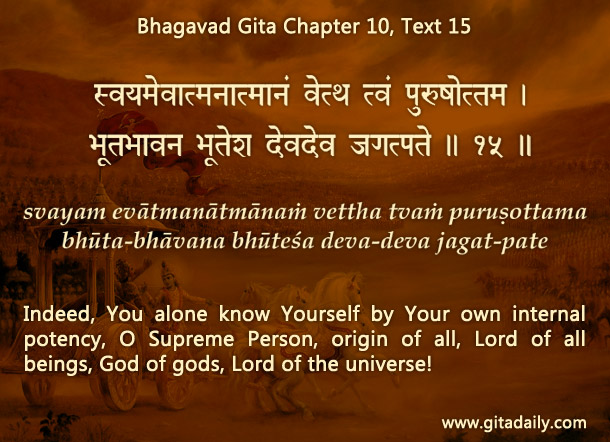When applied to the question of understanding God’s glory as is manifested in reconciling his paradoxical attributes, “I don’t know” is an admission of ignorance. In contrast, “I can’t know” is a statement of knowledge, an intelligent acknowledgement of the incomprehensibility of the infinite when confronted with the finite human capacity for comprehension.
In the Bhagavad-gita (10.14), Arjuna acknowledges that not even the gods can know Krishna’s personality and reiterates (10.15) that Krishna alone knows himself. Yet this statement doesn’t stop him from enquiring more about Krishna – to the contrary, he requests that Krishna speak about his glories in detail for those glories are unendingly relishable.
Acknowledgment of divine incomprehensibility doesn’t imply that Gita wisdom doesn’t answer basic questions about God’s glory – it answers, and answers coherently and cogently many questions that have deluded thinkers for millennia.
The Gita’s paradox – of acknowledging inability to know and expressing desire to know – underscores that the purpose of knowledge on the devotional path is not intellectual conquest, but devotional attraction. Devotees don’t want to know Krishna so that they can dissect him and have him all figured out. They want to know him because they love him and we naturally want to know more and more about those whom we love.
And when our love for Krishna is not yet strong, our acknowledgement of Krishna’s ultimate incomprehensibility opens the doors of paradoxes that were earlier intellectually shut for us during our spiritual journey. We no longer let seeming contradictions check our onward march towards Krishna.
We become like ocean divers whose purpose is not to measure the ocean, but to find pearls in it. The deeper we dive into the ocean of Krishna’s glories, the more we realize that his glories are infinite while simultaneously relishing that infinitude and falling increasingly in love with him.
Podcast:


My learning today
1. “…the purpose of knowledge on the devotional path is not intellectual conquest, but devotional attraction”.
2. “…become like ocean divers whose purpose is not to measure the ocean, but to find pearls in it. ”
Hare Krishna Hare Krishna Krishna Krishna Hare Hare
Hare Rama Hare Rama Rama Rama Hare Hare